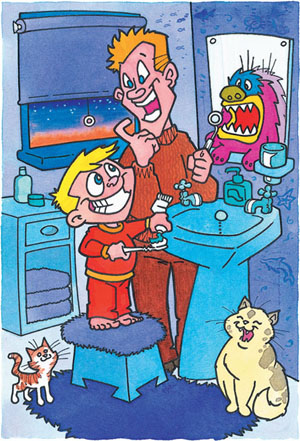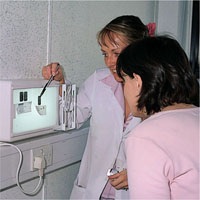Chapter 4
Parent Training
Aim
This chapter aims to review the importance of parents in providing dental treatment for children. Strategies to ensure a positive parental contribution will be outlined and issues surrounding the informed consent process will be discussed.
Outcome
On completing this chapter, the dental team should be able to develop a strategy to get the parent fully engaged in the delivery of oral health care and by so doing increase the likelihood of successful completion of treatment and of better life-long oral health (Fig 4-1).

Fig 4-1 Parent training.
Introduction
The dental team, in a paediatric dentistry context, needs to be expanded to include the parent or guardian. One of the key aims of the oral care of children is to create a long-term interest in ongoing prevention and by so doing ensure improved dental health in the future. To achieve this the parents must be fully involved.
The treatment alliance
The dentist must establish a relationship based on trust with the child and with the accompanying adult to ensure compliance with preventive regimes and to allow treatment to occur. This “treatment alliance” is essential, as dentists rely on parents to bring the child in the first place and many aspects of preventive care can only be achieved when parents and the dental team work together (see below, Psychological Preparation). Indeed, a realistic treatment plan cannot be successfully formulated without the full involvement of the parent (Fig 4-2).

Fig 4-2 The treatment alliance.
Many dentists have firm views on whether a parent should be present when dental treatment is carried out. However, parents also have views and many prefer to be there during treatment, especially if their child is young or attending an initial visit.
The major concern for dentists is the potential of the parent to disrupt treatment by inappropriate communication or by exhibiting anxiety themselves. The desire to exclude parents may also reflect the fact that many dentists are used to a one-to-one relationship with a patient and find the three-way interaction threatening. However, involving the parent in the planning stage and outlining their role as a passive but silent helper may provide a comforting presence without unhelpful interference.
Adverse parental effects
Dentists seek to exclude parents for a number of different reasons, including
-
their potential to confuse communication by:
-
repeating what the dentist says (annoying both child and dentist)
-
intercepting the dentist’s commands (acting as a barrier between dentist and child)
-
dividing the child’s attention between parent and dentist
-
dividing the dentist’s attention between child and parent
-
using inappropriate reassurance (“It won’t hurt”)
-
-
behaviour contagion (transferring their own anxiety)
-
well-intentioned but improper preparation
-
discussing negative aspects of dental treatment within hearing of the child (reinforces vicarious learning)
-
threatening the child with dental treatment (“The dentist will have to take your tooth out if you don’t let her fill it!”).
All of these can be avoided or overcome if the dental team take some time to explain the rules to the family (Fig 4-3).

Fig 4-3 Dentist and parent need to be “on the same side”.
Making parents part of the dental team
Research suggests that a child’s behaviour once in the dental surgery is unaffected whether a parent is present or not. The exception to this is with very young children (under 4 years of age) who behave better with their mothers present. Separation anxiety is a normal developmental stage, and it has been shown to be a good indicator of dental anxiety in childhood. Thus, for very young children, a parental presence is important whereas for older children, a parental presence appears not to have such a clear effect on child behaviour but may be important to the parent. What is essential is that individual practitioners explain their practice policies regarding parental presence to parents.
Psychological preparation
Psychological preparation of an anxious child is best performed by the parent. However, the practitioner should offer guidance for this role, or the preparation may not have the desired e/>
Stay updated, free dental videos. Join our Telegram channel

VIDEdental - Online dental courses


